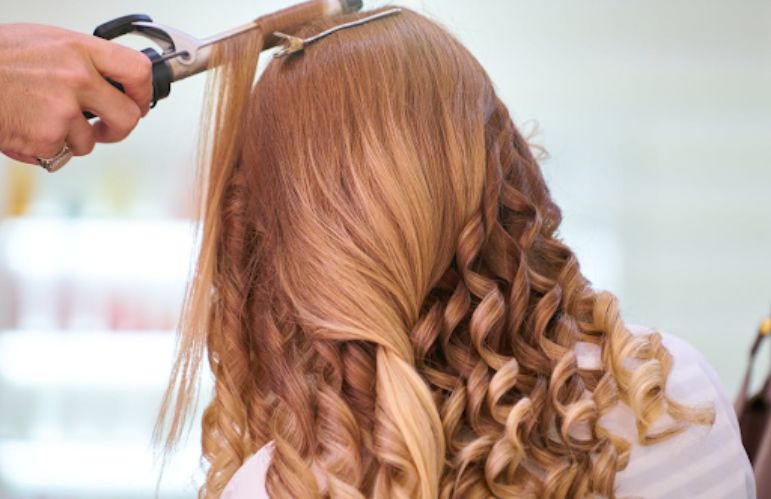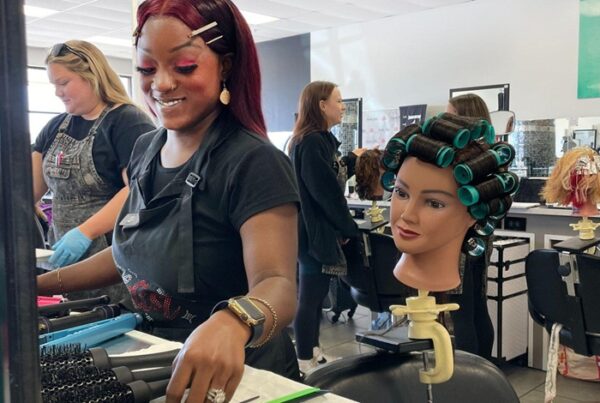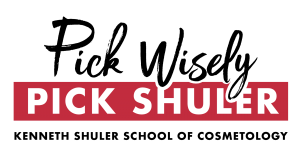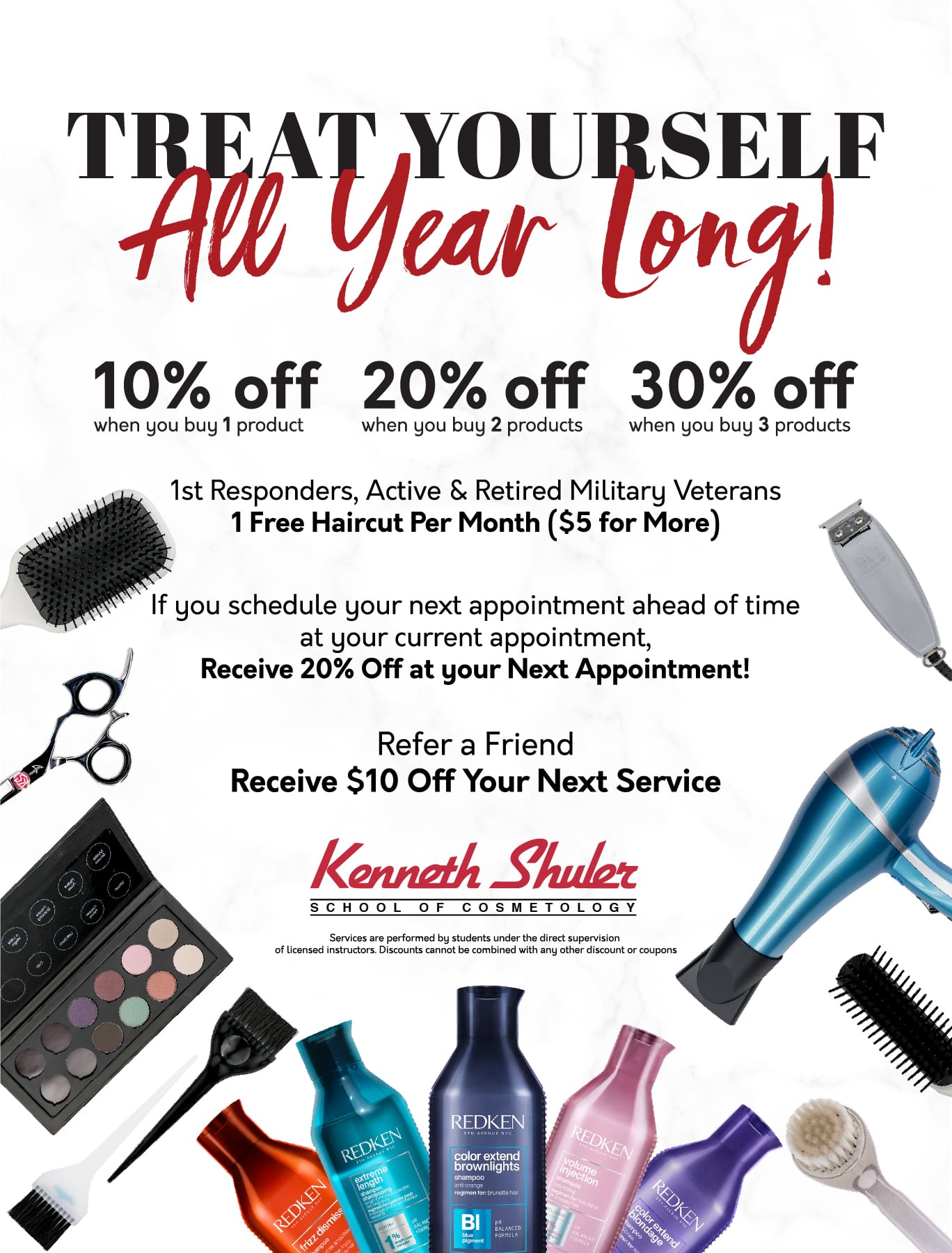
Guarding a paycheck you don’t love is draining, but quitting that paycheck without answers feels worse. If you’ve typed “beauty school near me” into your browser only to backspace after reading scary rumors, you’re in good company.
Adults come to our admissions office every week worried that they’re too inexperienced, too busy, or too cautious about money to switch lanes. Below, we unpack ten myths that block promising artists from a career they could enjoy, showing exactly how Kenneth Shuler School of Cosmetology turns each fear into a workable plan.
Myth 1: “I Need Natural Talent or Artistic Genes”
Some students arrive able to sketch portraits; others have never blended a highlight. Our instructors start everyone with the same foundations — sectioning hair, mapping skin tones, sanitation — then layer complexity through mannequin drills, peer practice, and supervised salon floor shifts.
Redken-backed cutting and color systems guide the path so progress is measurable instead of random. You can develop skills through practice because you practiced it step by step, not because you woke up talented.
Myth 2: “Beauty School Costs More Than I Can Handle”
Sticker shock fades once real financing options appear. Kenneth Shuler walks applicants through federal student aid, grants, and scholarships; staff also outline payment plans that spread tuition over reasonable monthly amounts.
Every award is documented, and nothing moves forward until you know the exact investment required. Clear math replaces mystery, letting you decide with facts instead of fear.
Myth 3: “Nobody Teaches Business in Cosmetology Programs”
Technical chops are half the equation; steady bookings pay the bills. That’s why our curriculum includes ProsperU business modules: creating service menus, setting retail goals, and building referral systems.
Coursework covers branding, client retention, and budgeting so graduates leave able to read a profit-and-loss sheet and track earnings.
Myth 4: “Esthetics Equals Basic Facials”
Modern skin care spans chemical resurfacing, light therapy, brow design, and ingredient-driven treatments. Kenneth Shuler esthetics labs stock Circadia and Dermalogica lines alongside spa-quality equipment, giving students hands-on experience with peel protocols, LED masks, and acne-reduction regimens sought by dermatology practices and destination spas.
Myth 5: “Passing the License Exam Is a Gamble”
Stress peaks around test time, yet our state-board prep helps remove surprises long before exam day. Students complete timed practicals under instructor supervision, receive written-test drills, and review kit checklists until every step feels automatic. This repetition turns the licensing process into an expected milestone rather than a coin toss.
Myth 6: “Beauty Careers Don’t Offer Reliable Income”
Wage data tells a broader story. According to the U.S. Bureau of Labor Statistics, hairdressers, hairstylists, and cosmetologists could earn a median hourly wage of $16.95 as of May 2024 bls.gov, while skincare specialists could reach $19.98 per hour bls.gov.
Real numbers vary by location, skill set, and business savvy—areas Kenneth Shuler addresses through ProsperU marketing lessons and portfolio-building workshops. Our career-services staff tracks openings in salons, medical offices, and cruise lines, then shares leads with graduates, to support your transition into the field.
Note: Earnings vary by location, specialization, and experience. These figures are based on national data—consult the current BLS Occupational Outlook Handbook for the most recent updates.
Myth 7: “I Can Learn Everything Online for Free”
YouTube tutorials explain technique, but a camera can’t duplicate the feel of live shears against a neckline or the pressure of a real client adjusting in the chair.
Kenneth Shuler student salons welcome paying guests, exposing learners to genuine hair textures, skin conditions, and service-time demands. Mistakes happen under instructor supervision, so you refine skills in a safe space instead of risking public reviews.
Myth 8: “Beauty School Schedules Conflict With Full-Time Work”
Our campuses offer day and night classes. Many students keep current jobs, parent daytime kids, or serve in the military reserves while completing required clock hours. Because sessions start throughout the year, you can enroll when your calendar truly opens rather than waiting a full semester.
Myth 9: “The Industry Caters Only to Women”
Enrollment grows more diverse each term. Barber-style fading, beard design, brow sculpting, and makeup for film attract all genders. Kenneth Shuler classrooms focus on universal techniques — line work, symmetry, color theory — so any graduate can serve clients without gender assumptions holding them back.
Myth 10: “Advancement Stops After I Graduate”
Beauty careers evolve quickly, and so can you. When offered, Kenneth Shuler alumni return for advanced workshops on balayage, lash lifting, or paramedical camouflage; others compete in skills contests that sharpen speed and creativity. Ongoing education keeps services fresh and expands the menu you can offer, which in turn boosts earning potential.
How We Turn Doubt Into Action
- Personal advising – Admissions advisors outline program pathways based on your goals and timeframe.
- Transparent cost planning – Every scholarship, grant, and payment plan appears on paper before you commit (for those who qualify).
- Structured skill building – Lesson plans move from theory, to mannequin, to live model, ending with real guests.
- Business readiness – ProsperU modules teach branding, budgeting, and sales techniques alongside technical work.
- Career services for life – Résumé reviews, mock interviews, and job-lead emails continue long after graduation.
Choosing a Training Home
Plenty of schools advertise bells and whistles; we focus on measurable benefits:
- 50-plus years educating South Carolina stylists and estheticians
- Redken Premier School status provides access to recognized color theory and product partnerships.
- Tablets in every student kit—your projects stay organized and digital from day one
- Portfolio development starts early, so you leave with photographs and service records that showcase progress.
Each point helps students address real-life worries: How will I learn new trends? Who will teach me to market? How do I show employers what I can do?
Frequently Asked Questions
How long will the program take?
Completion time depends on the schedule you choose and state clock-hour requirements. Admissions can outline an estimated finish date during your campus tour.
Do I need my own equipment?
A professional starter kit comes with tuition. Larger machines such as steamers and dryers remain on campus for training, so upfront purchases stay minimal.
Can I start if I’m straight out of high school?
Yes. Plenty of recent graduates enroll alongside career changers. We adjust teaching methods to different learning backgrounds so everyone keeps pace.
Ready to Bust Your Final Myth?
Changing careers feels lighter once you see training up close. Walk our salon floor, watch a color correction unfold, and ask graduates how they balanced class with real life. For example, a quick visit to our beauty school in Rock Hill can answer more questions in an hour than weeks of online scrolling.
Curious where your closest Kenneth Shuler School of Cosmetology campus sits? Explore all locations and program start dates here: Find a location near you. It might be the easiest click you make this week — and the first toward a career that finally feels like yours.
Financial aid is available to those who qualify.






